
Sales managers are responsible for growing revenue. To do that, they have to create an environment where their sellers can be successful.
That means 1) providing sales reps with the guidance they need to continuously improve, 2) building a sales process that gives reps the best chance at closing each lead, and 3) understanding which efforts are moving the needle and which are a waste of energy.
The right sales management software helps managers achieve all of these goals, from the daily tasks to the big picture.
In this post, we’ll give you our picks for the most effective sales management software platforms currently on the market, as well as a practical overview of how sales management software helps your business close more deals.
Sales management software is a type of business software designed to give sales managers insight into their team’s performance and the effectiveness of their sales pipeline so they can make strategic improvements.
Sales management software supports many aspects of the sales process, including:
Sales management software provides lots of benefits to your company, whether you sell B2B or B2C and regardless of your business size. Here are a few of the reasons why businesses need sales management software:
There are many sales management software tools available, though they each have unique features. Let’s take a close look at the best sales management software systems out there.
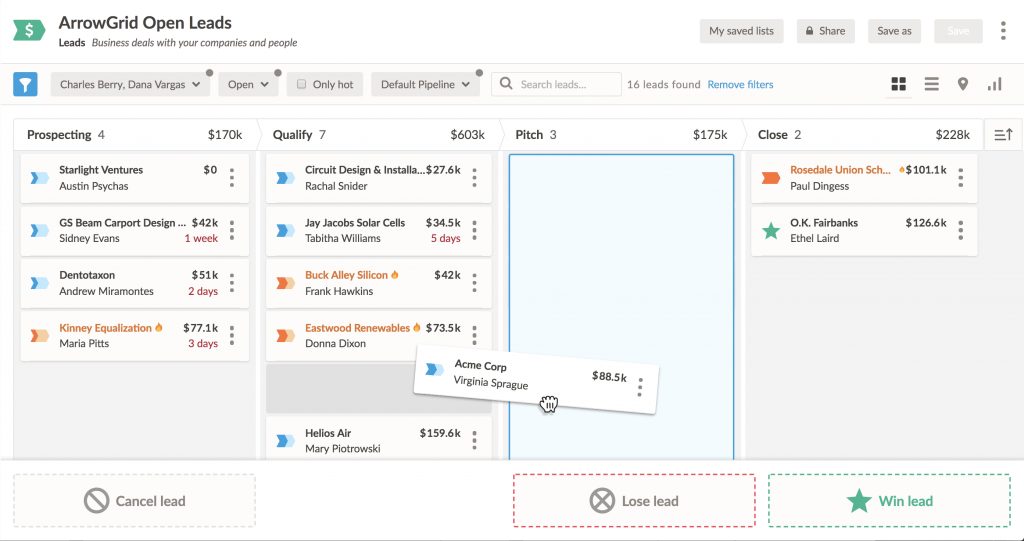
Nutshell is an all-in-one customer relationship management (CRM) and email marketing platform that helps B2B organizations work together to win more deals.
Nutshell is a fully customizable platform with sales automation and email sequencing capabilities, and integrates with Gmail, Outlook, Mailchimp, Intercom, Unbounce, and many other business applications.
Featuring four sales pipeline management views, including a drop-and-drop lead board, Nutshell is flexible enough to be used by outbound sales teams, inbound sales teams, relationship-based sales teams, or any other B2B sales force.
Unlike most other sales management systems, Nutshell offers free live customer support, unlimited contact records and data storage, and sales analytics reporting. It comes out of the box with all the tools that your sales team will need to start selling smarter.
Nutshell offers simple, no-contract pricing with multiple tiers so you can select the plan that is perfect for you and your sales team.
Join a live demo to see our powerful, easy-to-use CRM at work!

Pipedrive is a flexible and simple sales management software that provides a good option for small sales teams. Pipedrive offers a company-wide viewing feature specifically so that sales managers can track their sales teams’ performance right in the software.
Most notably, Pipedrive offers round-the-clock chatbots that provide natural-sounding responses to help advance prospects through the pipeline. Salespeople can also easily track emails, meetings, and other conversations to stay on top of what’s happening across the team.
Pipedrive also integrates with other sales and marketing tools so you can get the most out of your sales management initiatives, without all the copying and pasting.
Freshsales is a CRM served up by Freshworks, and is one of many tools in their predictably-named software suite. As sales management software, Freshsales plays nicely with the other Freshworks applications, which support various business needs, like support desk service, recruiting, and more.
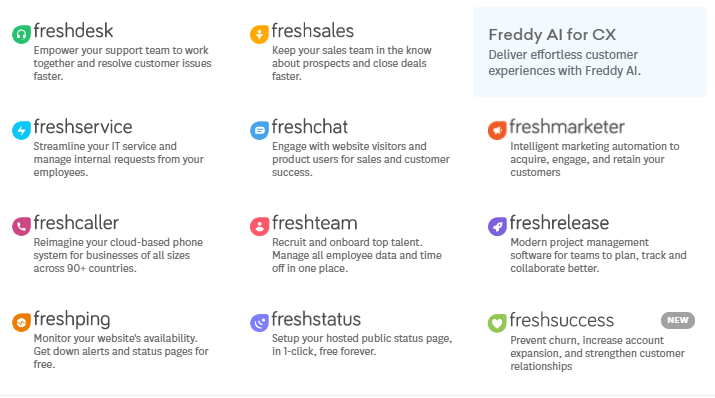
Freshsales allows salespeople and management alike to automatically schedule emails, meetings, and more, right within the software. This is a super useful feature that helps users stay on top of the critical communications that help build prospect and customer relationships.
Zoho CRM is a sales management application in Zoho’s huge app ecosystem. The apps are typically sold in bundles, which can make it tricky to get a quote if you’re just looking for the CRM.
Zoho offers basic sales management functionality, including automation, like converting web visitors into leads, or advancing prospects from one pipeline stage to the next. It also features top-notch sales reporting, allowing sales managers to report across products, locations, accounts, and more.
Within the platform, users can also manage tools outside the sales management scope, like social media and customer service.
Nimble is a sales management software suite that integrates with various tools across the sales and marketing worlds. This clever system keeps your applications in one place, making it easier to manage customers and prospects alike.
This sales management suite features a useful “Today” page that allows salespeople to stay up-to-date on their activities and make informed decisions.
Nimble also helps sales managers sell “smarter” by delivering sales intelligence to every salesperson on their teams. This award-winning feature, combined with Nimble’s deal forecasting, pipeline analytics, calendars, and task management, make it a comprehensive sales management tool with real depth.
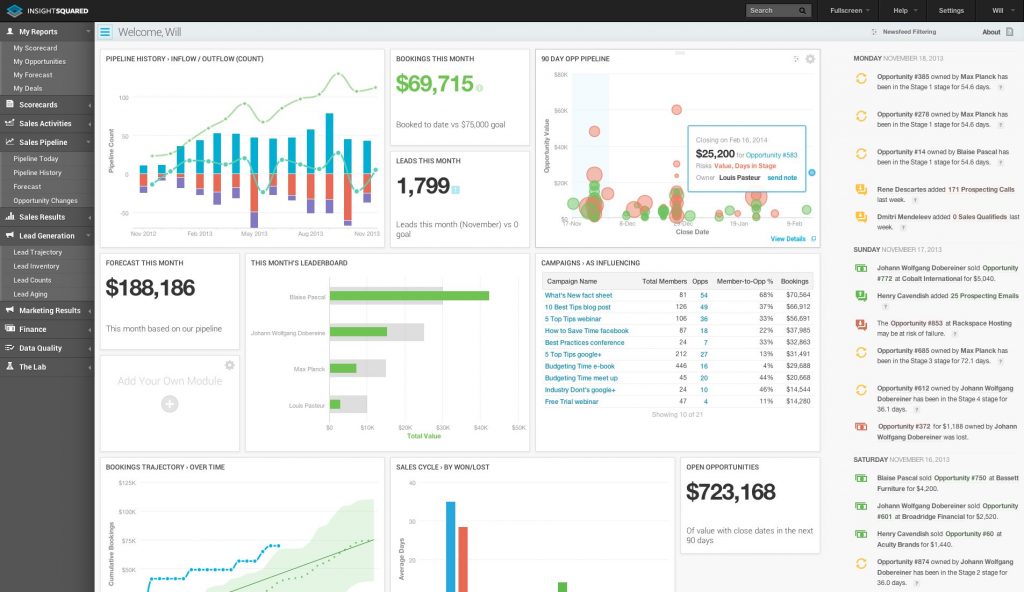
Billing itself as an “end-to-end RevOps platform,” InsightSquared crunches data across your entire sales funnel with the goal of helping every team in your organization—from marketing and sales to customer success and even staffing—make more informed decisions.
InsightSquared’s sales management tools use AI to surface information that sales leaders would find useful, such as alerting you when customers are going dark or identifying what top sales reps are doing to stand out from the pack. Managers can also leverage 120 pre-configured “Actions” designed to improve the efficiency of their sales process, or easily customize their own.
Even if you’re intimidated by “machine learning,” InsightSquared’s reporting suite is worth recommending. The platform’s activity reports are detailed, each won or lost deal is explained by relevant data, and the ability to manage your entire pipeline from a single dashboard is a nice touch.
Databox is a business analytics platform that centralizes relevant data from your sales, marketing, advertising, and website tools, so you can get a complete view of your overall performance without having to switch between tools. Databox’s dashboards are fully customizable and simple to build, helping you visualize your data in the way that makes the most sense to you.
For sales managers, one of the valuable elements of Databox is how it approaches quotas and goal-setting. The platform shows you your current daily, weekly, and monthly performance when you’re setting new targets, to ensure that you’re setting realistic sales goals. You can set goals for a wide range of metrics from any of Databox’s 70+ integrations, and track progress toward those goals in real time.
Databox also shines in its KIP scorecards and notification features. From actionable trend insights to Slack notifications, these tools ensure that the sales manager is always the most well-informed person in the room.
LevelEleven is a sales performance management system that helps managers reinforce key behaviors for their sales and customer-facing teams. Launched in 2012 as a sales gamification app, LevelEleven has evolved into a comprehensive suite of “data-driven coaching” tools designed to motivate, engage, and develop sales reps.
LevelEleven’s coaching tools include rep performance snapshots that show you each seller’s efforts and results on a daily basis and automated coaching workflows to ensure that coaching is happening on a regular cadence.
Another helpful tool for managers (as well as the C-suite) is LevelEleven’s executive scorecard, which shows you how different units in your organization are performing against their goals, and gives senior leaders an easily digestible way to identify problem areas and take action.
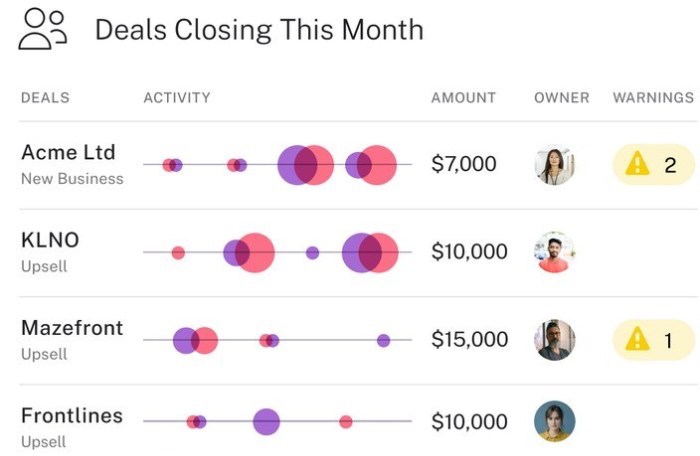
Revenue intelligence platform Gong has pivoted its message to being the “#1 platform for remote sales teams”—with impressive results.
The core of Gong’s platform is conversational insights, drawn from your team’s phone calls, emails, and even in-person meetings. Gong records and analyzes every sales conversation and provides sellers with actionable guidance based on that analysis. The platform also allows sales reps to search for specific words or phrases in previously recorded sales calls, which can be a huge time-saver.
Sales managers can leverage the conversational analysis data collected from their reps to build a “sales playbook,” showing what their most effective reps are doing differently in terms of the questions they ask, how they discuss pricing, and their talk-to-listen ratio. In addition, Gong helps managers maximize their pipeline by showing them the status of each deal and which ones are at risk.
Nearly all sales CRMs include tools that are designed for sales management, although some CRM platforms are more manager-focused than others. If you’re shopping for a sales management system, make sure it includes these ten features out of the box.
There are certain questions that sales managers ask themselves on a daily basis: How are this month’s sales stacking up to last month’s? Is revenue up year-over-year? What’s the current quantity and value of all the leads in our pipeline, and which leads are closest to the finish line?
The dashboard of your sales management system should summarize all of this high-level data, so you can see it as soon as you open the application instead of having to click around the tool to find it.
If you want to dig deeper into your historic sales performance, your sales management software should make that easy too.
Customizable sales reports allow you to view your company’s revenue over a specific period of time, as well as filter your sales by product, lead source, territory, individual reps, or custom criteria. By drilling down into the data, you can identify trends that help you fine-tune your overall strategy.
While sales reporting helps you understand your past performance, forecasting reports help you see into the future. Every sales management software platform should include forecasting tools that help you estimate your upcoming sales based on the quantity and value of open leads in your pipeline and your average closing rate or lead confidence.
Sales forecasts show you how well you’re tracking against your goals for the month, quarter, or year, and whether your team needs to focus more of their effort on closing deals or filling their pipeline with new leads.
Sales management tools help you quickly find the status of every single open lead, so managers don’t have to spend all day asking individual reps, “Where are we on the Goldstein account?”
Pipeline management features track which stage of the pipeline a given lead is in, what needs to happen next to move the lead forward (and who needs to do it), and other relevant information like the age and value of the lead. Ideally, your sales management software should also display which leads are the highest priority for your team to close.
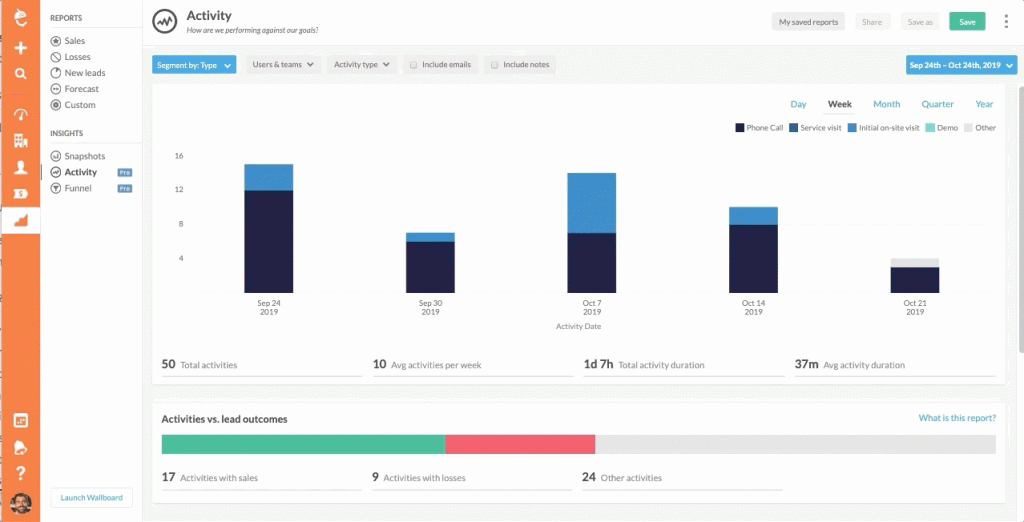
The purpose of activity reports isn’t to make sure your reps are “staying busy.” It’s to make sure that they’re spending their effort where it counts.
Activity reports track how many activities your sales team members are completing broken down by type, how long they’re spending on those activities, and how many of those activities are associated with actual sales.
This is critical information that helps managers adjust their team’s approach to communication—Are cold emails more effective than cold calls? What is the optimal length of a sales presentation?—and build a blueprint for success that every rep can follow.
Related: How to use a CRM activity report to coach your sales team
When your sales process is formally defined and visible to every member of the team, there’s no more confusion about what’s supposed to happen next on a lead. (“Wait, was I supposed to follow up with that guy?”)
Sales management software allows you to design a customized sales process that’s purpose-built for the way you sell, with standardized stages and tasks that every rep has to follow. This reduces the learning curve for new hires and ensures that valuable opportunities don’t float away due to disorganization.
If your company generates a high volume of inbound leads every single month, your sales manager probably doesn’t have time to evaluate every single one and decide who to give it to.
Sales management systems allow you to set up automated assignment rules based on criteria such as territory, industry, value, product, and lead source, meaning that every lead goes to the rep who’s most likely to close it, without the manager having to lift a finger.
Or, to keep things perfectly fair, you can also use your sales management software to set up an automated round-robin system for lead assignment, so that leads are distributed evenly across every rep on your team.
What’s great about sales management software is that it completely replaces the need to hound your team about the little things. (“Did you send that email? Have you booked that demo? Did you send the order out for delivery?”) Instead, automated reminders let reps know when tasks are overdue and which ones are coming up next.
Nutshell’s sales automation suite also allows sales managers to enter guidance on each pipeline stage, so you can provide advice and best practices on how to keep each lead moving merrily along—another great tool for getting new sales reps up to speed quickly.
As a sales manager, it’s very likely that you have concrete revenue targets to hit, established by your company’s leadership. To hit those targets, each one of your sales reps has to be a contributor. An essential feature of sales management software is the ability to set sales quotas for individual team members, as well as for your team as a whole.
Quota features make it easy to track your team’s revenue against your overall goals, and see which individual reps are carrying most of the weight (and should be rewarded accordingly) and which reps are lagging behind.
For some expert advice on how to create healthy, productive sales quotas, read this.
Even the best sellers can’t be completely successful if they’re following an inefficient process. A funnel report shows you which percentage of your leads are converting at each stage of your pipeline, so you know exactly where leads are getting stuck or lost. A funnel report can also tell you:
Funnel reports are a great example of how sales management software arms sales leaders with actionable data that they can use to make targeted improvements to their process.
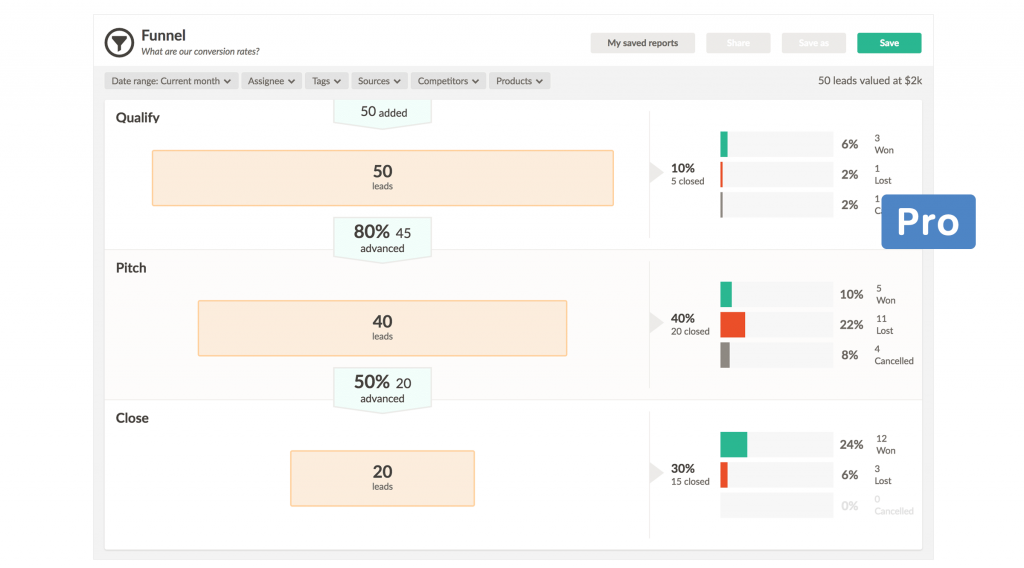
The Sales Manager’s Survival Guide includes 70+ expert tips on hiring, coaching, and motivating your sales team. Download it today!

If you still have questions about what sales management software can do for your team, check out the FAQs below:
Besides looking for sales management software that has the critical features listed above, there are a few other factors to consider when choosing a tool for your business:
It can be time-consuming to train your reps on complicated new software. How can you streamline the process and make it easier to train employees on the new system? Follow these tips:
The goal of sales management is to create and implement strategies that will help your sales team hit and exceed their revenue targets. Sales management software gets you out of the weeds so you can focus on what matters.
Need a sales management tool to make your life easier? Try Nutshell free for 14 days. At just $49/month/user, our Pro package gives you a full suite of sales management tools, plus rep-focused features like personal email sequences and free in-app phone dialing that will turbocharge the effectiveness of your selling team. Give it a shot!
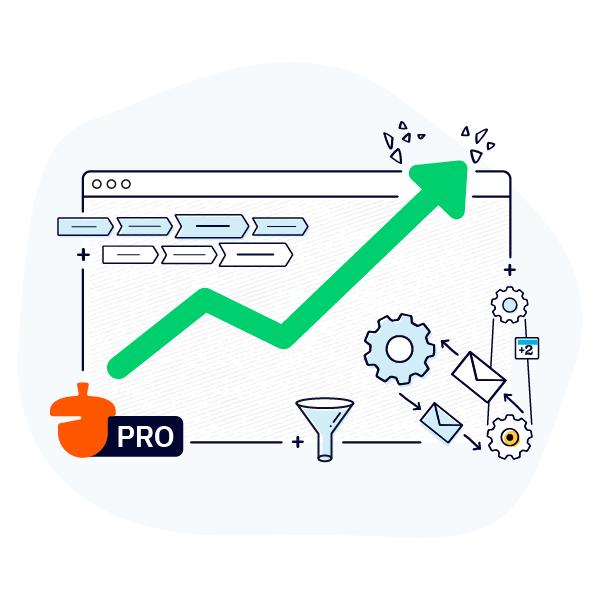
Join 30,000+ other sales and marketing professionals. Subscribe to our Sell to Win newsletter!